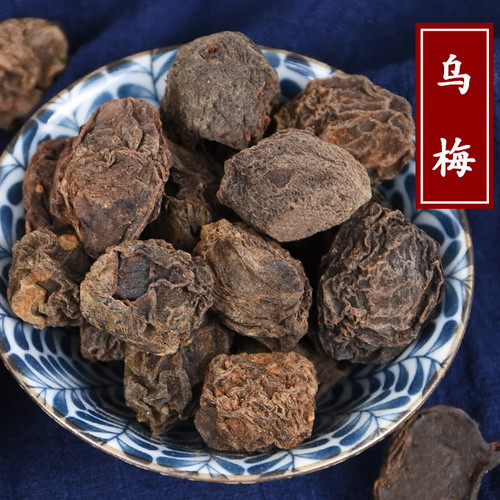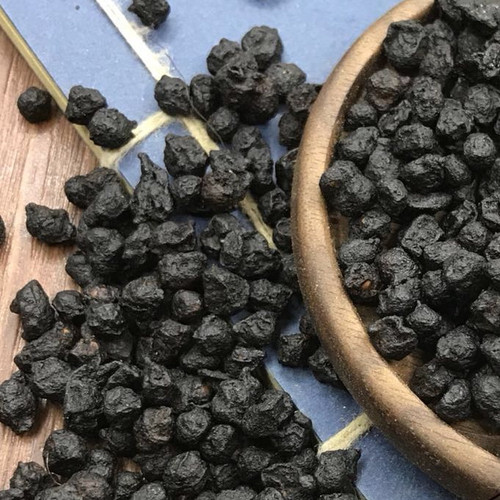Product Overview
Parts used: Dried ripe fruit
TCM category: Herbs that stabilize and bind
TCM nature: Neutral
TCM taste(s): Sour
Meridian affinity: Spleen Large intestine Liver Lung
Scientific name: Prunus mume
Other names: Japanese apricot, Black plum, Ume plum
Use of chinese plums (Wu Mei) in TCM
Please note that you should never self-prescribe TCM ingredients. A TCM ingredient is almost never eaten on its own but as part of a formula containing several ingredients that act together. Please consult a professional TCM practitionner, they will be best able to guide you.
Preparation: The fruit is harvested when it is nearly mature and it becomes dark after being dried at low temperatures.
Dosage: 3 - 9 grams
Main actions according to TCM*: Stabilizes Lung Qi and stops cough. Stops diarrhea. Retains Bodily Fluids and encourages their production. Expels parasites and relieves vomiting.
Primary conditions or symptoms for which chinese plums may be prescribed by TCM doctors*: Whooping cough Dysentery Diarrhea Intestinal parasites Abnormal uterine bleeding
Contraindications*: Should not be used by those with Excess and Stagnation with Internal Heat nor when there is an External pathogenic influence present.
Common TCM formulas in which chinese plums are used*:
For chronic Lung Deficiency coughs combine chinese plums with crow-dipper rhizomes (Ban Xia), tangerine peel (Chen Pi), fresh ginger (Sheng Jiang) and apricot seeds (Xing Ren).
For abdominal pain and nausea due to tapeworms, especially with Cold deficiency combine chinese plums with sichuan pepper (Hua Jiao) and goldthread rhizomes (Huang Lian).
Key TCM concepts behind chinese plums (Wu Mei)'s properties
In Traditional Chinese Medicine (TCM), chinese plums are plants that belong to the 'Herbs that stabilize and bind' category. This category of herbs is used for treating abnormal discharges and displacement of organs. This includes conditions such as diarrhea, discharges from the vagina, penis or rectum as well as prolapse of the uterus or rectum. It is important to note that herbs in this category only treat symptoms, so one should also use herbs to treat the underlying Deficiency.
Furthermore chinese plums are plants that are Neutral in nature. This means that chinese plums typically don't affect the balance in your body. Balance between Yin and Yang is a key health concept in TCM. Eating too many "Hot" (Yang) ingredients can lead to an imbalance whereby one has a Yang excess. The inverse is true as well: too many "Cold" (Yin) ingredients can lead to a Yin excess. The Neutral nature of chinese plums means that you don't have to worry about that!
Chinese plums also taste Sour. The so-called "five elements" theory in Chinese Medicine states that the taste of TCM ingredients is a key determinant of their action in the body. Sour ingredients like chinese plums help with digestion and restrain abnormal discharges of fluids from the body, such as diarrhea or heavy sweating.
The tastes of ingredients in TCM also determine what organs and meridians they target. As such chinese plums are thought to target the Spleen, the Large intestine, the Liver and the Lung. In TCM the Spleen assists with digestion, blood coagulation and fluid metabolism in the body. The Large Intestine on the other hand receives the "impure" parts of the digested food from the Small Intestine, absorbs the remaining fluids and excrete the remainder as feces. The Liver is often referred as the body's "general" because it is in charge of regulating the movements of Qi and body fluids. It also takes a leading role in balancing our emotions. In addition to performing respiration, the Lungs are thought to be a key part of the production chain for Qi and the body fluids that nourish the body.
Use of chinese plums (Wu Mei) as food
Chinese plums are also eaten as food. It is used as an ingredient in dishes such as Umeboshi or Maesil-cheong.







